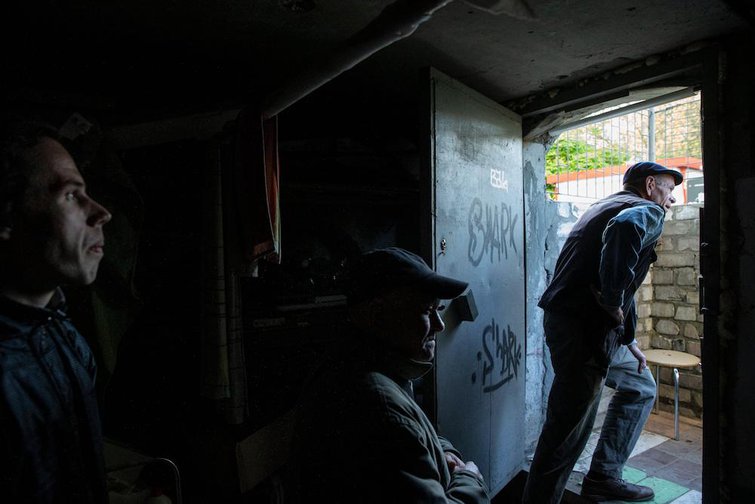Liudochka, my childhood friend, is in Lviv. She tells similar stories. She’s waiting in a hospital, her husband in surgery. Someone approaches, brings her water. Offers her a bag of food.
“No, thank you, we’ve got some.”
“Take it, keep it for dinner.”
Awkward.
Awkward is the self-perception of the displaced. Awkward in someone else’s cosy apartment. In the gym, where a hundred people have gathered. Awkward with receiving so much attention as a perfectly healthy adult.
Awkward to admit that you’re displaced now. To recognise it.
Even more awkward is the fact that you left, but someone else stayed behind. Friends. Relatives. You are in paradise. You even read news reports differently now. Before, in hell, they came across as more optimistic.
“Good morning! How are you?”
“Good morning.
I’m alright.
No heating.
No electricity.
No internet.”
Not a tourist trip; a much longer journey. We don’t have a change of clothes. We rummage for our sizes.
“Don’t take any spares. Someone else might need it.”
Before, we would have helped ourselves to an armful of stuff. For free.
Depeche Mode plays on my phone. ‘Walking in My Shoes’. Grateful to the person in whose shoes I walk now.
The displaced can be recognised by their backpacks and the plastic bags they’re carrying, filled with humanitarian aid. Also, by their rapid pace. The displaced move fast: from explosion to explosion.
A shopping queue. At once, it’s apparent who is local and who isn’t. The local has extra items in his cart. Fermented milk, not just milk. A spiced bun. A can of herring. A displaced person has the basics. White bread, pasta, canned meat. Potatoes, onions.
Sometimes it’s the other way around. Potato chips, sweets, Coca-Cola – this is a displaced person too.
We call a plumber. He’s a neighbour from downstairs. He sees to everything, explains how to use things.
“Thank you very much. How much do we owe?”
“How much do you pay for this apartment?”
“Nothing.”
“And nothing for me, either. You already said thank you.”
The apartment belongs to a childhood friend who is in Italy now.
I thought that once I’d broken free, I’d walk a lot. Just walk everywhere. But I sit at home and listen hard. To everything. The rustling of tyres outside – aeroplanes. A refrigerator door slamming. Stomach growling loudly.
My wife and daughter, Lena and Nadya, have been here for several days. They say this will pass.
At five in the morning, the upstairs neighbour drops something. Nadya and Lena leap up and run. So do I.
The displaced arriving from Donbas in 2014: impudent and noisy. Now I’m the impudent and noisy one. Except, also quiet.
Others see us. They encourage us. They sympathise and comfort us. But we are, in truth, runaways. From the war.
A volunteer from Lviv hands us some medicine: “Hang in there. Everything will be OK.”
He’s heading to Kharkiv. To the war.
I run into an optician. A hairdresser. A teacher I once gave some advice to. Acquaintances from Kharkiv that I hadn’t seen for years. Half of Kharkiv is now in Poltava. The other half – all the destroyed buildings – have stayed behind.
The cat has started to purr again. She hadn’t purred for a month. She just mewed. Like the rest of us.
Children who get released from basements come to life first. We follow suit – after the children and the animals. But the war is far from over.
And it won’t be over when it ends. You will continue to carry it within.
My daughter says: “We will remember the war as something historical, ancient. Something we’ve gone through; we’re going through.”
I shave off my beard bit by bit over the course of the month. Every day. A shorter moustache. Off the cheeks. The temples. A bit from the chin. I’ll encounter myself soon.
We scream in our sleep every night. We don’t remember those dreams. Most often we shout “No!”
Not everything that happens gets revealed these days. A lot is kept secret. I don’t know what’s happening inside of me, either. And what I do know, I don’t reveal much, either. After victory, all of these things will be divulged.
I understand where this writing style comes from. It’s the style of news channels on Telegram. They’re all I’ve read since the beginning of the war. Facts and the state of things. We will analyse and reflect later, after the victory. Right now, others analyse and make plans for us. We can only feel and live through it.
“I was in the wrong yesterday. I realised that you shouldn’t be loud and quarrel in wartime. So as not to be like Putin. During the war, there should be peace in the family at least.”
Classes have resumed. Yesterday I sent a message to the students.
In the newsfeed today:
“A third-year student at the VN Karazin Kharkiv National University, Vadym Pavlenko, perished along with his father while trying to flee Izyum.”
And a photograph. I get to see him for the first time. We’ve done distance learning up to now, with just our avatars online.
He had signed up for one of my courses for the second time. He attended every lecture. He asked questions.
Translated by Tanya Breslin Zaharchenko


Comments
We encourage anyone to comment, please consult the oD commenting guidelines if you have any questions.